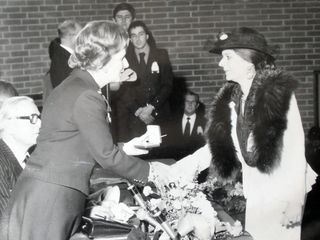Stirabout Theatre

Stirabout was the first British professional theatre company specifically formed to take performances and drama workshops into enclosed institutional settings such as prisons, borstals and detention centres. When Stirabout began the concept of drama workshops in prisons was unheard of and only a handful of the over 180 penal establishments nationwide allowed live performances – usually only the London ones and only at Christmas. By 1979 Stirabout were allowed into over 120 institutions to perform and were regularly running prison workshops
Stirabout, (‘stir’ is slang for prison), was founded by Corinna Seeds in 1974 to take theatre performances and drama workshops into prisons. The company was a registered charity and its patron was Dame Flora Robson.
Corinna knew from the outset that they would have to compromise and liaise with people whose political views they completely disagreed with in order to achieve their goals. The company aimed to abide by the rules (however ridiculous), be allowed in, be accepted and trusted, and then start working to change attitudes towards theatre and drama work in prisons.
Few institutions had stages – usually the performances took place in the chapel or the gym. In some top security prisons Stirabout performed on landings (the space between cells) and the prisoners, who were not allowed out, watched through their cells bars The average audience size was 500 people.
The drama workshops took place in classrooms under the auspices of the prison’s Education Department.
In 1979 Stirabout expanded to include a Gallery which exhibited prisoners’ artwork and literature above their rehearsal space in Camden Lock.
Corinna was doggedly persistent and finally managed to be allowed to run drama workshops in prisons – at a time when inmates were still sewing mailbags and only allowed 2 sheets of writing paper a week. She walked a fine line for all the ten years, balancing and pushing boundaries.She described it as " frustrating, fulfilling, exhilarating, and dangerous both physically and emotionally, but I made lifelong friends inside prisons and in Stirabout." Shortly after Margaret Thatcher's conservative government drastically slashed funding for the arts, Corinna emigrated from the U.K. to Greece. On the official emigration tax form, under ‘Reasons for leaving’, she wrote ‘Thatcherism.’
Peggy Shannon
One of Stirabout's early company members was Peggy Shannon who was then a budding actress and musician.
Peggy has described her time with Stirabout as "a huge life lesson which gave me the confidence to deal with whatever is thrown my life. Going into a prison was initially frightening, then depressing (the gates clanging shut; the sound of keys and more keys and even more keys; the stares from inmates…) but also exhilarating. In Stirabout I gained an appreciation for working as a collective and creating new work for a specific audience. I developed a passion for directing and administration. I worked closely with Corinna, learning about theatre administration and I directed for the first time. Corinna was – and has remained over the years – formidable. I loved watching her forcefully deal with the many personalities both in the company and inside the prison system."
Peggy and Corinna's collaboration in performing and running drama workshops in prisons during Stirabout's early years led to their life-long friendship and to their later collaboration in Hydrama.

Fulton prison workshop

Margaret Thatcher and Corinna Seeds

Wormwood Scrubs prison
